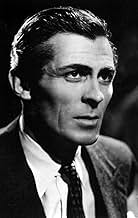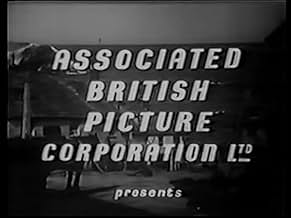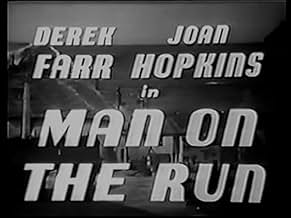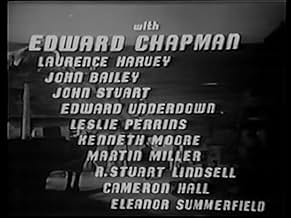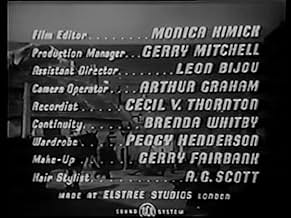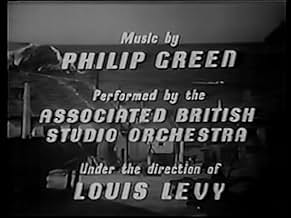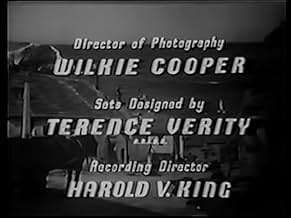Ajouter une intrigue dans votre langueIn post-war Britain, an army deserter unwittingly gets involved in murder and armed robbery and enlists the aid of a war widow to help clear his name.In post-war Britain, an army deserter unwittingly gets involved in murder and armed robbery and enlists the aid of a war widow to help clear his name.In post-war Britain, an army deserter unwittingly gets involved in murder and armed robbery and enlists the aid of a war widow to help clear his name.
Howard Marion-Crawford
- 1st Paratrooper
- (as Howard Marion Crawford)
Kenneth More
- Corporal Newman
- (as Kenneth Moore)
Martin Miller
- Cafe Proprietor
- (as Martyn Miller)
Avis en vedette
Peter Burden (Derek Farr) is an army deserter, one of twenty thousand British men who live in fear of imprisonment even after the war has ended. Having served four years, the authorities denied his request for compassionate leave in order to attend his mother's deathbed and he absconded in disgust. He is now working as a landlord of a country pub and is pulling pints when an old army acquaintance (Kenneth More) walks in and recognizes him. Corporal Newman is newly demobbed and, having found only low-paid work in the area, opportunistically blackmails Burden. Terrified, Burden flees again, this time returning to London, where a lack of funds and the late rent on a ragged bedsit force him to try and pawn his old service revolver. At the jeweller's, however, two armed robbers arrive and promptly kill a copper, with Burdon believed to be part of the gang.
His attempts to elude the police become more perilous than ever and a desperate escape sees him bounding breathlessly into the house of young widow Jean Adams (Joan Hopkins). Jean takes pity on the ex-soldier and agrees to help. The pair become determined to find the robbers, knowing only that one of them (Edward Underdown) is missing two fingers on his left hand. All the while, they must avoid the grimly persistent Chief Inspector Mitchell (Edward Chapman) and Detective Sergeant Lawson (a young Laurence Harvey), who prove to be quite able pursuers...
Lawrence Huntington directed, produced and wrote this foray into near-noir which was presumably inspired by the many deserters still at large long after V. E. Day. His script carefully positions Burdon as a sympathetic figure (the name is well-chosen).
The sad circumstances surrounding his desertion and the fact he had spent most of the war in combat is repeated at least once. To steer clear from presenting him as a coward or a chancer was undoubtedly important as everyone in the audience would have known soldiers or might even have been one themselves. Huntington also has his protagonist plea for a more constructive solution to the problem, particularly when so many such people inevitably turn to crime to survive. This situation, often forgotten today, makes Man on the Run interesting and slightly more nuanced than other chase thrillers, though it so solidly sides with Burdon that a more minute exploration of similar issues facing other such soldiers - for example, post-traumatic stress or the frustrating futility of war itself - is avoided altogether. There's a sense that each man would have his own story, though nobody describes what those might be.
Derek Farr is excellent as Burdon: pained, thoughtful, and reluctant to enlist anyone else's help. It's a shame he didn't have more of a career as he could easily have become a Kenneth More. More himself pops up early on, well before his middle-class every-man persona, like an English James Stewart in tweeds and a pipe, would lead him to become one of Britain's biggest film stars.
The police investigation, meanwhile, is headed by the sort of dogged, pipe-smoking detective familiar to pictures of this period, with Chapman's chief inspector wry and astute enough to elicit tension.
It's this quietly humming, will-they-catch-him? Element which carries the film, particularly in the excellent first half, though a thrilling set-piece of the sort included in The 39 Steps (which also had a bad guy deprived of a digit) or North By Northwest is unfortunately even more elusive than Burdon himself.
Particularly interesting for its glimpses of post-war life (from genuine London locations to a reference to radio's proto-James Bond Dick Barton), plus some gently amusing moments, Man on the Run makes for an entertaining and compelling thriller which is much recommended.
His attempts to elude the police become more perilous than ever and a desperate escape sees him bounding breathlessly into the house of young widow Jean Adams (Joan Hopkins). Jean takes pity on the ex-soldier and agrees to help. The pair become determined to find the robbers, knowing only that one of them (Edward Underdown) is missing two fingers on his left hand. All the while, they must avoid the grimly persistent Chief Inspector Mitchell (Edward Chapman) and Detective Sergeant Lawson (a young Laurence Harvey), who prove to be quite able pursuers...
Lawrence Huntington directed, produced and wrote this foray into near-noir which was presumably inspired by the many deserters still at large long after V. E. Day. His script carefully positions Burdon as a sympathetic figure (the name is well-chosen).
The sad circumstances surrounding his desertion and the fact he had spent most of the war in combat is repeated at least once. To steer clear from presenting him as a coward or a chancer was undoubtedly important as everyone in the audience would have known soldiers or might even have been one themselves. Huntington also has his protagonist plea for a more constructive solution to the problem, particularly when so many such people inevitably turn to crime to survive. This situation, often forgotten today, makes Man on the Run interesting and slightly more nuanced than other chase thrillers, though it so solidly sides with Burdon that a more minute exploration of similar issues facing other such soldiers - for example, post-traumatic stress or the frustrating futility of war itself - is avoided altogether. There's a sense that each man would have his own story, though nobody describes what those might be.
Derek Farr is excellent as Burdon: pained, thoughtful, and reluctant to enlist anyone else's help. It's a shame he didn't have more of a career as he could easily have become a Kenneth More. More himself pops up early on, well before his middle-class every-man persona, like an English James Stewart in tweeds and a pipe, would lead him to become one of Britain's biggest film stars.
The police investigation, meanwhile, is headed by the sort of dogged, pipe-smoking detective familiar to pictures of this period, with Chapman's chief inspector wry and astute enough to elicit tension.
It's this quietly humming, will-they-catch-him? Element which carries the film, particularly in the excellent first half, though a thrilling set-piece of the sort included in The 39 Steps (which also had a bad guy deprived of a digit) or North By Northwest is unfortunately even more elusive than Burdon himself.
Particularly interesting for its glimpses of post-war life (from genuine London locations to a reference to radio's proto-James Bond Dick Barton), plus some gently amusing moments, Man on the Run makes for an entertaining and compelling thriller which is much recommended.
The blu ray cover says this is a key post war British noir unseen since the first release.
I don't think it is a key film compared to It Always Rains On Sunday or The Blue Lamp.
I like the film,it looks good.
The pub sets look great,I want to eat in that cafe,is it Fitzrovia maybe?
But the tone of the film is stiff and dated compared to Waterloo Road or It Always Rains on Sunday.
Don't get me wrong,it is not a bad film but it is not daring compared with It Always Rain.
Indeed They Made Me A Fugitive is similar in theme to this and a better film in my opinion.
"Man on the Run" is interesting for several reasons.
One is the postwar atmosphere in England and the problem they had with deserters, many of whom were on the run and resorting to crime. Here in the U. S., 21,000 people were charged and sentenced for desertion during World War II - 49 were sentenced to death, but only one sentence was carried out.
Although over 21,000 American soldiers were given varying sentences for desertion during World War II, including 49 death sentences, Slovik's death sentence was the only one that was carried out.
The main character in this is Peter Burden (Derek Farrar). After four years in the service, he needed extra time on his leave because his sister was dying. He was refused and stayed with her anyway.
Peter is in hiding when approached by someone who knew him, a Corp. Newman (Kenneth More, in a small part). Newman wants blackmail money; instead, Peter takes off.
When Peter tries to pawn his gun, the pawnshop is robbed at the same time by two men. The police think it's three. He is being chased through the streets when he runs into an apartment building. There he meets a widow, Jean Adams (Joan Hopkins) who agrees to help him. She hides him and lets him stay at her place.
Peter knows certain distinguishing features of one of the men and feels if he could just find him, the police would learn of his innocence. By a series of circumstances, the police zero in on Jean, so she and Peter take off to a friend's place out of London.
The chase continues, and it's Jean who actually sees someone in a cafe that she thinks is one of the robbers.
Too many coincidences in the story, but the actors are likeable, and you do pull for both of them.
Not only did More appear, but all during the film, I kept thinking one of the police detectives looked like Laurence Harvey. That's probably because it was Laurence Harvey.
One is the postwar atmosphere in England and the problem they had with deserters, many of whom were on the run and resorting to crime. Here in the U. S., 21,000 people were charged and sentenced for desertion during World War II - 49 were sentenced to death, but only one sentence was carried out.
Although over 21,000 American soldiers were given varying sentences for desertion during World War II, including 49 death sentences, Slovik's death sentence was the only one that was carried out.
The main character in this is Peter Burden (Derek Farrar). After four years in the service, he needed extra time on his leave because his sister was dying. He was refused and stayed with her anyway.
Peter is in hiding when approached by someone who knew him, a Corp. Newman (Kenneth More, in a small part). Newman wants blackmail money; instead, Peter takes off.
When Peter tries to pawn his gun, the pawnshop is robbed at the same time by two men. The police think it's three. He is being chased through the streets when he runs into an apartment building. There he meets a widow, Jean Adams (Joan Hopkins) who agrees to help him. She hides him and lets him stay at her place.
Peter knows certain distinguishing features of one of the men and feels if he could just find him, the police would learn of his innocence. By a series of circumstances, the police zero in on Jean, so she and Peter take off to a friend's place out of London.
The chase continues, and it's Jean who actually sees someone in a cafe that she thinks is one of the robbers.
Too many coincidences in the story, but the actors are likeable, and you do pull for both of them.
Not only did More appear, but all during the film, I kept thinking one of the police detectives looked like Laurence Harvey. That's probably because it was Laurence Harvey.
The great shame of unused female actors in British cinema is far too long; Joan Greenwood was an example, and rarely given roles that were truly worthy of her. Joan Hopkins is another and even less well known than Greenwood or many others. A pity because she had a statuesque beauty, and a quiet charm and in some shots her beauty almost rivals Greta Garbo. Opposite Derek Farr there is good chemistry, and for once she is pivotal to the film and not only decoration. Farr is a deserter from WW2 and on the run not only for that, but for a murder he is suspected of committing. Hopkins takes him into her flat and the two fall in love. I liked too the atmosphere of the UK after the war, with its turmoil at getting back to a previous life that will never come again. A fluctuating chaos that lasted through the late 1940's and the mid to late 1950's. The film is rich on detail, and there is Kenneth More as a war veteran in a small but significant role. Well directed,, and in the main well acted, it is worthy of hunting down for all those interested in this period of history, and the run down houses peeling with damp and cold bear no resemblance to the wealth there today. These films are essential to UK history and the passing of times, and the poverty and wealth that goes with it. And Joan Hopkins is quite simply excellent.
An astringent little drama painting a vivid picture as shot by Wilkie Cooper of a seething postwar London rife with deserters, blackmailers and other lowlifes.
Top-billed Joan Hopkins is rather stiff as the heroine, but this actually renders her more more rather than less appealing - not being conventional leading lady material - and as usual the supporting case is full of entertaining surprises, including early appearances by Kenneth More and a moustached Laurence Harvey in only his second film role as a detective.
Top-billed Joan Hopkins is rather stiff as the heroine, but this actually renders her more more rather than less appealing - not being conventional leading lady material - and as usual the supporting case is full of entertaining surprises, including early appearances by Kenneth More and a moustached Laurence Harvey in only his second film role as a detective.
Le saviez-vous
- AnecdotesThe dialogue includes several clear uses of "basket" as a minced oath for "bastard". However the film was given an 'A' certificate (for "Adult Audiences") by the British Board of Film Censors, because of the depiction of an armed robbery.
- GaffesKenneth More is listed as Kenneth Moore in the opening credits but is listed correctly in the closing credits.
- Citations
Sgt. Peter Burden, alias Brown: Well, do you believe any of this, or am I just wasting my time?
Meilleurs choix
Connectez-vous pour évaluer et surveiller les recommandations personnalisées
Détails
- Date de sortie
- Pays d’origine
- Langue
- Aussi connu sous le nom de
- Mann im Netz
- Lieux de tournage
- société de production
- Consultez plus de crédits d'entreprise sur IMDbPro
- Durée1 heure 22 minutes
- Couleur
- Rapport de forme
- 1.37 : 1
Contribuer à cette page
Suggérer une modification ou ajouter du contenu manquant

Lacune principale
By what name was Man on the Run (1949) officially released in India in English?
Répondre
